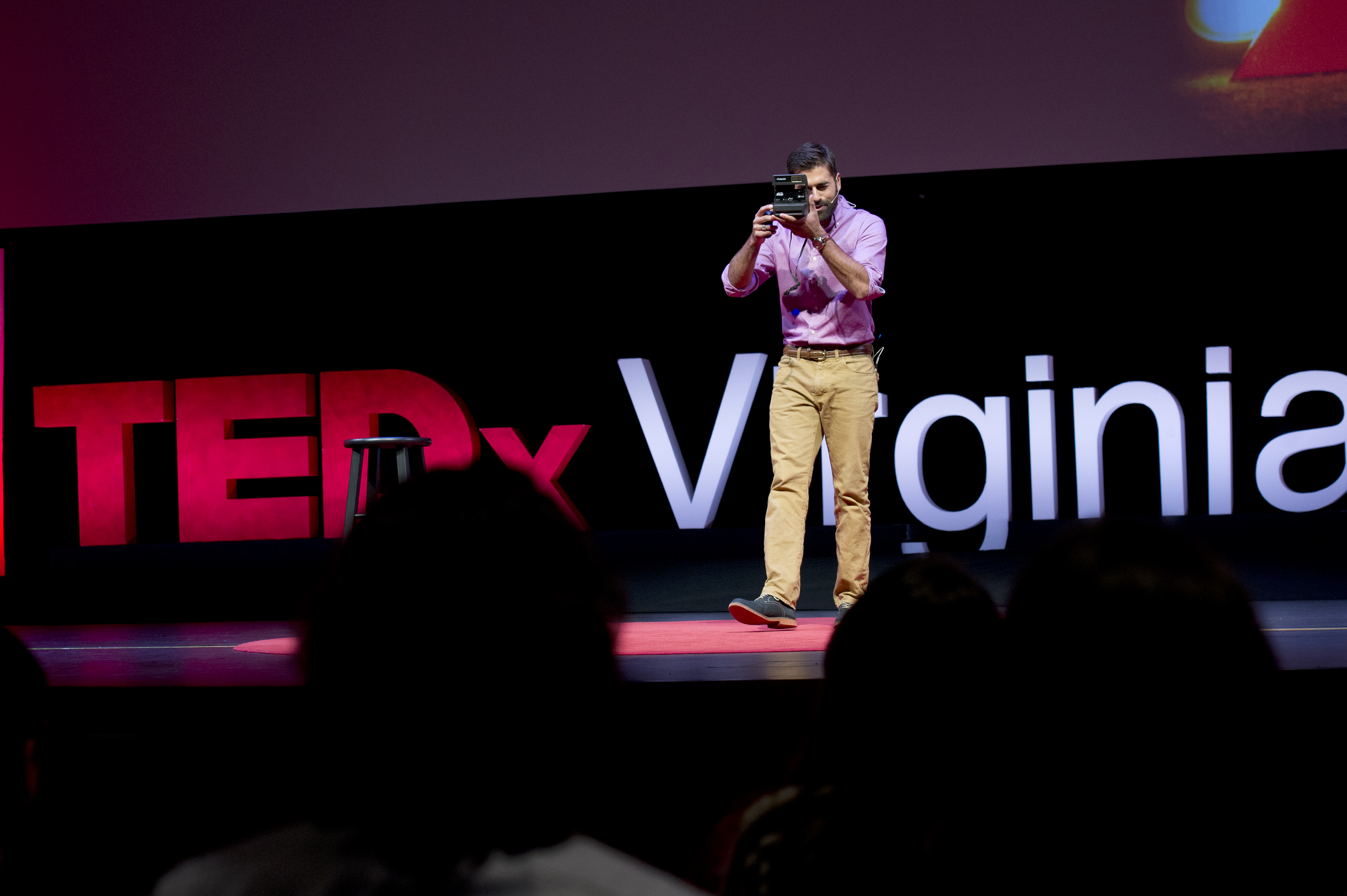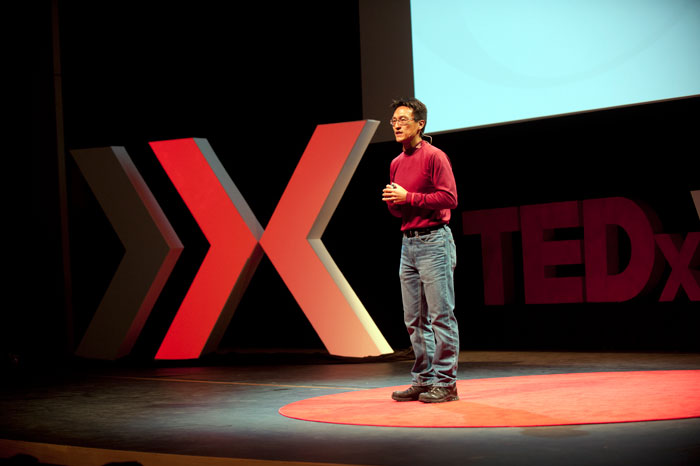TEDxVirginiaTech announces 2015 theme of 'Kaleidoscope,' calls for speaker nominations

“Kaleidoscope” will be the theme for TEDxVirginiaTech 2015 on Nov. 19 at the Moss Arts Center. TED enthusiasts and great speakers, thinkers, and doers are invited to “give the talk of a lifetime” at the fourth annual event.
The broad theme is meant to inspire multidisciplinary and transformative ideas in line with the principles of TED, a nonprofit organization devoted to ideas worth spreading. “Kaleidoscope” plays off of the instrument itself, which uses mirrors to reflect objects in a variety of patterns. Highlighting change and diversity, the theme evokes a broad range of literal and figurative interpretations and proposes intriguing questions, such as:
- What changing patterns or scenes are we seeing in various disciplines? In the world?
- What happens when we look at the same topic using multiple disciplinary lenses?
- When do variation and transformation create a new reality?
- Who has the resolve to rotate our view of the world ever so slightly and alter our collective future?
- How can we change our viewpoint to see things differently?
- What is the value of seeing things from another perspective?
- How can we adjust our ideas of inclusion and diversity to design beautiful new forms of community?
- What have we recently discovered that has been in front of us the entire time?
- How does color, reflection, light affect us?
- How has viewing something from another perspective altered your life or career?
- How can old and new problems be seen differently?
- How can we implement more creativity into our lives?
- What is the value of change?
The TEDxVirginiaTech committee invites university faculty, staff, students, alumni, and New River Valley community members to submit nominations for speakers. Deadline for submissions is April 17. Self-nominations are welcome and encouraged.
“TEDxVirginiaTech – Kaleidoscope will engage the Virginia Tech, local, and global community in the value of diversified perspectives and the unique opportunities that interdisciplinary collaboration offers,” said Peter Doolittle, professor with the School of Education and director of Virginia Tech’s Center for Instructional Development and Educational Research. He serves on the organizing committee of TEDxVirginiaTech. “As we continue to Invent the Future, we must constantly analyze, question, and revisit old, new, and conflicting viewpoints to solve problems and innovate.”
Nominations will be accepted at the TEDxVirginiaTech website until April 17, with a short list of prospective speakers being invited to pitch their talks to selection committees in May. Final speakers will be publicly announced in August. Nominations should include: the potential speaker’s name, affiliation with Virginia Tech, email address, description of idea worth spreading, how the idea relates to the event theme, and information about why the nominee is a credible speaker.
Speakers at the event will be allotted up to 15 minutes to address a topic that has broad appeal, relates to the event’s theme, and is an idea worth spreading -- a central principle held by the nonprofit organization. Dynamic, highly visual presentations coupled with a storytelling speaking style are encouraged. As with TED guidelines, speakers are disallowed from addressing political and/or religious agendas, or promoting a company, and also precluded from using podiums or notes during their talk.
TEDxVirginiaTech talks will be streamed live online. The talks also will be recorded, and the resulting files will become part of the larger TEDx Talks archive. As a result, allotted times will be enforced. To assist with the requirements of speaking at a TEDx event, speakers will receive mentoring in the development of their presentations and their presentation delivery by the TEDxVirginiaTech steering committee.
More than 800 people attended TEDxVirginiaTech 2014 at the Moss Arts Center. Previous TEDxVirginiaTech speakers have spoken at TEDGlobal, been featured on TED.com and in national publications, and received prestigious honors for their work.
About TEDx, x = independently organized event
In the spirit of ideas worth spreading, TEDx is a program of local, self-organized events that bring people together to share a TED-like experience. At a TEDx event, TED Talks video and live speakers combine to spark deep discussion and connection. These local, self-organized events are branded TEDx, where x = independently organized TED event. The TED Conference provides general guidance for the TEDx program, but individual TEDx events are self-organized. (Subject to certain rules and regulations.)
About TED
TED is a nonprofit organization devoted to Ideas Worth Spreading, usually in the form of short, powerful talks (18 minutes or fewer) delivered by today's leading thinkers and doers. Many of these talks are given at TED's annual conference in Vancouver, British Columbia, and made available, free, on TED.com. TED speakers have included Bill Gates, Jane Goodall, Elizabeth Gilbert, Sir Richard Branson, Nandan Nilekani, Philippe Starck, Ngozi Okonjo-Iweala, Sal Khan and Daniel Kahneman.
TED's open and free initiatives for spreading ideas include TED.com, where new TED Talk videos are posted daily; the Open Translation Project, which provides subtitles and interactive transcripts as well as translations from thousands of volunteers worldwide; the educational initiative TED-Ed; the annual million-dollar TED Prize, which funds exceptional individuals with a "wish," or idea, to create change in the world; TEDx, which provides licenses to thousands of individuals and groups who host local, self-organized TED-style events around the world; and the TED Fellows program, which selects innovators from around the globe to amplify the impact of their remarkable projects and activities.
Dedicated to its motto, Ut Prosim (That I May Serve), Virginia Tech takes a hands-on, engaging approach to education, preparing scholars to be leaders in their fields and communities. As the commonwealth’s most comprehensive university and its leading research institution, Virginia Tech offers 240 undergraduate and graduate degree programs to more than 31,000 students and manages a research portfolio of $513 million. The university fulfills its land-grant mission of transforming knowledge to practice through technological leadership and by fueling economic growth and job creation locally, regionally, and across Virginia.





